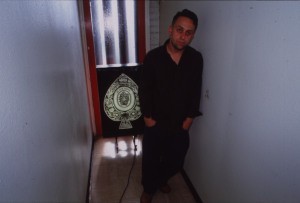
File download is hosted on Megaupload
I don’t know what is the rarest, most expensive or most obscure record among my modest record collection. But somewhere among the latter category lies Hotline by Black Lodge. If I had to give it a category it might be obscurest record I listen to regularly.
True, Hotline has a Discogs entry. But this hardly inspires confidence, claiming “Promo release only 2 copies pressed up”. It doesn’t even list the B side (it is Baby, in case anyone from Discogs is listening). Other than that, it draws an online blank.
Maybe that makes it sound like my CD promo of Hotline (picked up for 49p in a charity shop in Islington many years ago) could be worth something. But I don’t think so. For a start, CDs rarely command a high value. And for a second, no one seems to really care about Black Lodge. (They should do. But I’m coming to that.) In fact the only other person I know who likes them used to do Black Lodge’s press, many years ago. And even he was surprised that I had a copy.
Hotline, then, is one of those records that aren’t even obscure enough to be rare (in the sense of worth something), which somehow only makes it more obscure.
In a way you can understand the record’s obscurity: Black Lodge (aka Mancunian Dan Dwayre) was signed to Mo’ Wax in 2001, just as things started to go slightly astray for the label. (He had previously remixed Badly Drawn Boy’s Disillusion in 2000 – pretty much the only Black Lodge music you’ll find on iTunes).
Horse With No Name / Ha Dili, Black Lodge’s debut release for the label (and brilliant with it), came out in 2001, when Mo’ Wax was long past its commercial peak and its roster was more interesting than vital (Malcom Catto, Tommy Guerrero, Parsley Sound etc).
Blood Brass / Gay Boy, a release shared between Lodgewars and Mo’ Wax, followed in 2002. Hotline would have come next (its release number is MWR157) but was apparently shelved when XL’s relationship with Mo’ Wax ended, around 2003.
(Tommy Guerrero’s Soul Food Taqueria [MW158] was released in April 2003 and its label is described as “Mo’ Wax, Beggars Group” [Beggars being XL’s parent company], which makes an early 2003 release date for Hotline seem likely.)
And then… silence, until 2008, when Discogs lists a joint cassette release by Black Lodge / I.U.D on The Trilogy Tapes (a label run by Will Bankhead, who did artwork for Mo’ Wax back in its peak).
This was followed by three Black Lodge release in 2010: an untitled two 12-inch release of re-edits, limited to 500 copies and with no listed label; and the Kings Arms Sessions volumes 1 and 2, both on The Trilogy Tapes and both very limited (the first to 90 copies, to second to 100).
More details are scant: the genre for Volume 1 is listed as “Electronic, Rock” and for Volume 2 is “Electronic, Folk, World, & Country, Rock” (which doesn’t sound a great deal like the Black Lodge of old). Band members are named as Nathan Sudders, Sophia Lockwood, Giles Hatton, Stuart Ian Jones and Dan Blacklodge.
If you want to hear the music, the only things available from this period on YouTube are Broughton and Details off the untitled re-edits release. They’re pretty great – Broughton especially – but, by their very nature not especially enlightening as to what Black Lodge might have been up to all these years.
Back to Hotline, then: the other reason you might not be surprised by its obscurity is it is a fundamentally very strange record. Hotline itself is a disco-y number whose ostensible chorus samples two telephone helpline operators, one saying “welcome to hotline” in a polite Southern English accent, the other “hello” (or possibly “headache”), with the samples cut and looped to resemble Steve “Silk” Hurley’s Jack Your Body.
Baby, meanwhile, is a Mancunian dancehall number, back when dancehall rarely influenced the wider dance world, with a baby (possibly several babies) providing the vocals. On paper, this sounds awful, an exercise in obfuscation and obscurity. And yet is precisely this oddness – the willingness to juxtapose something as ridiculously virile as dancehall with the gurglings of a baby – that characterises the best of Black Lodge’s work.
Blood Brass, for example, probably the best known of Black Lodge’s music (and still not exactly a chart topper), manages to mix Pink Elephant on Parade from Dumbo with a ska lurch, making them sound like they were born for each other.
Maybe this makes Black Lodge sounds like a terrible novelty artist, combining unlikely and ill-fitting genres in the name of a cheap laugh. But really he isn’t. Instead, he falls more in the Matthew Herbert / Pepe Bradock school of dance music production, using sampling technology to expand the palette of noise that can be used in modern songs.
But while Herbert can sometimes overwhelm with his seriousness, Black Lodge never does. Why favour chin stroking, after all, when dancing is more fun?
And you can certainly dance to his music. In fact, this is one of Black Lodge’s particular strong points – every last sound in his music, is tightly wound and full of rhythm, an approach which transforms unlikely, sometimes mundane, sounds into dancefloor dynamite. You’ll dance to a telephone operator with Black Lodge and it won’t seem weird.
Add to this a sense of melody and just enough restlessness to keep things twisting, turning and always interesting – those drums that shift into reverse for an unexpected half bar, a camera shutter sample that pops up every minute, just when you need it, and no more – and you have a remarkable talent, a handful of brilliant tracks and a brace of records that really shouldn’t be as obscure as they are, record label problems or not.


































